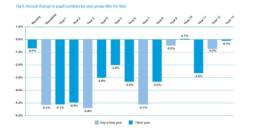Since the Labour Party announced in the 2024 Autumn Budget that the VAT exemption for private schools would be removed, many parents and grandparents have been left wondering how to adjust their financial plans to manage the potential rise in fees.
The policy came into effect in January 2025, and now, several months after its implementation, new figures from the Independent Schools Council (ISC) reveal the details of how it has affected school fees and pupil numbers.
If you’re concerned about how to fund your child or grandchild’s education, an Amber River financial planner can work with you to create a bespoke plan that balances your long-term goals with the rising costs of school fees.
Read on to find out what the latest data reveals about the real cost of private education in 2025, and how financial planning can help make it work for your family.
The average school fees in January, once the VAT exemption had been revoked, were up 22.6% compared to the same period a year earlier.
Most schools reduced fees, but the average price has increased significantly
To help soften the blow of the VAT exemption being revoked, many independent schools took steps to protect parents from the full 20% increase.
The ISC data shows that schools made an average fee reduction of 5% when VAT came into effect in January. This meant parents typically shouldered around 14% of the additional cost.
Nearly 70% of independent day schools cut their fees in January, with just over 10% reducing them by between 10% and 20%, and a small number going even further. Conversely, about a third of schools held fees steady, and a handful (1.3%) increased them.
Despite many schools reducing fees, the average fees in January, once the VAT exemption had been revoked, were up 22.6% compared to the same period a year earlier. To put that increase into perspective, fees rose by 8.4% in 2024 and 6.4% in 2023.
Day school fees now average £7,382 a term (roughly £22,000 a year), compared with £6,021 in January 2024, representing a rise of nearly £4,000 a year on average.
Of course, some schools have increased fees considerably more, and this is particularly the case among leading independent schools. For example, the Guardian reports that Eton has increased their fees by nearly £11,000.
So, if you have children or grandchildren whose school fees are looking a lot steeper than they did last year, it’s a good idea to speak to a financial planner. They can help you explore different ways to fund education and build a longer-term strategy for covering the costs.
With forward planning, you can support your child or grandchild’s education without putting your wider financial goals at risk.
Total pupil numbers have fallen by more than expected
The government had previously estimated that around 3,000 pupils would move into the state sector. However, the latest numbers show the preliminary drop-off rate to be far higher than predicted.
The BBC reports that January 2025 saw around 11,000 fewer pupils enrolled in private schools across England compared to the same time last year. This represents a 1.9% drop overall.
There’s also some evidence to suggest that parents are opting not to enrol their children at key entry points, such as reception or year 7, rather than taking them out once they’ve already started at the school.
The graph below shows the annual change in pupil numbers by year group.

Source: ISC
The biggest changes were in reception, year 1, year 3, and year 7, three of which are key intake years.
This suggests that many parents are facing a binary choice of whether to send their child to an independent school for the next critical chapter of their education.
Despite concerns, bursaries have increased
Despite reports that independent schools would no longer be able to afford to offer as much support as they did before VAT was added, bursaries have increased significantly.
The ISC data shows that more than a third of pupils (34.5%) at independent schools now get some form of help with their fees. Altogether, this adds up to over £1.5 billion in support, which is an 11.4% jump compared to last year.
The graph below shows the percentage of pupils receiving support, either from their school or from other sources.

Source: ISC
While the data shows that support from schools has increased, there is still more support coming from external funding sources. So, it’s a good idea to explore all available options that could help contribute to the cost of your child’s education.
Applying for bursaries is just one of many ways to help cover the cost of your child or grandchild’s education. While they can play an important part, they are often just one piece of the puzzle, and many families use them alongside other financial planning strategies to create a long-term plan for education funding.
An Amber River financial planner can help you manage the cost of your child’s education
With fees on the rise and pupil numbers starting to dip, many families are reassessing the cost of private education and deciding whether it’s still viable for them – this is where Amber River can help.
An Amber River financial planner can explore various options, such as spreading the cost through tax-efficient investment strategies, or using assets or income to manage the fees. They can also alert you to bursary or funding opportunities, either from the school or outside sources.
Most importantly, an Amber River financial planner will take a holistic approach to your situation, ensuring your wider long-term goals remain on track while also finding solutions to funding your child or grandchild’s education.
Our school fees planning page has more information on how we can help.
Get in touch
To set up an initial appointment, call 0800 915 0000. Alternatively, you can use our contact form to arrange an appointment.
Disclaimer
The information within this article was correct at the time of publishing, but laws and tax rules are subject to change. Your circumstances and where you live in the UK may also have an impact on your tax treatment.
Related Posts
21 December 2024
Read More

19 July 2024
Read More

5 July 2024
Read More

23 September 2023
Read More



